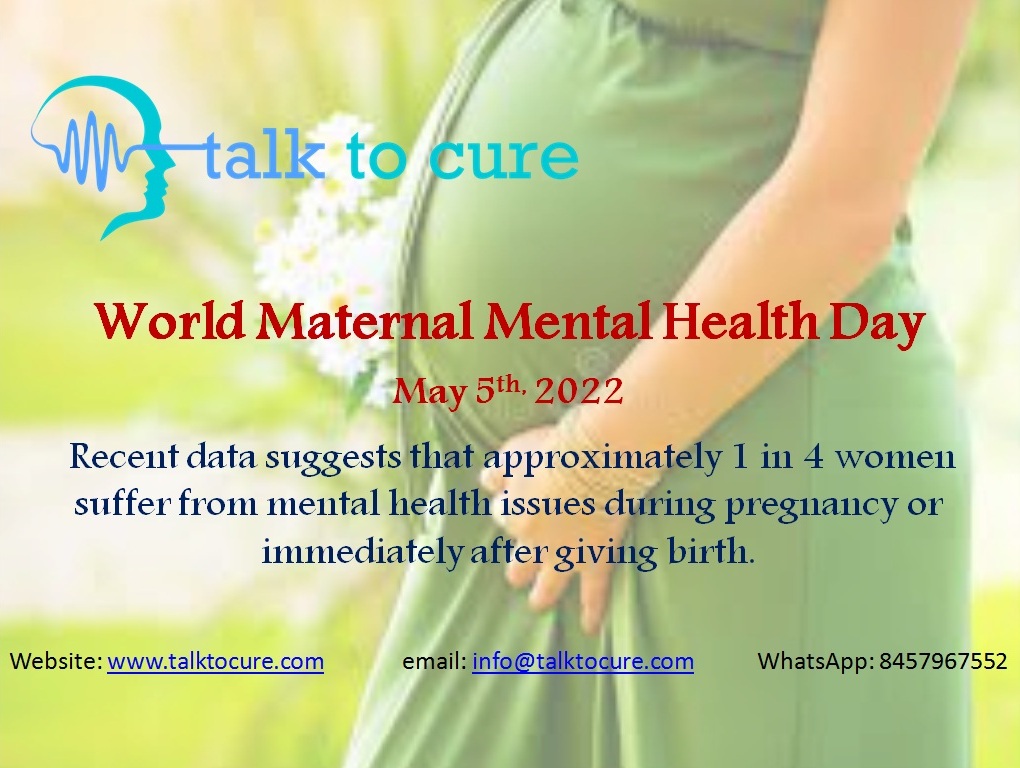MATERNAL MENTAL HEALTH

Mental health is an integral part of an individual’s healthy lifestyle and it is said that there is no health without mental health. As an individual we all have different responsibilities and roles in life, and the load of our responsibilities demands mental wellness in varying degrees. Every individual is expected to play different roles in life; however, women have been given an added responsibility by nature to give birth and nurture a new soul. In lieu of that, responsibilities of a woman are more demanding and beyond comparison. There are several factors impacting mental health and any individual with additional responsibilities may have to face and undergo some sort of mental health issues. Pregnancy is not only about carrying a child in the womb, it is also about struggling and accommodating with the changing body. During this time, a woman experiences weight gain, enlarged belly, swelling in legs, nausea, vomiting, changes in appetite, food preferences, hormonal changes, etc. Going through the phase of pregnancy, giving birth, growing and nurturing a child is gratifying for most women; however, every woman turning into a mother may not feel the same. According to World Health Organization (WHO), approximately 10% of pregnant women, and 13% of women who just gave birth experience some kind of mental health issue worldwide. The rate is even higher in developing countries i.e., 15.6% during pregnancy and 19.8% after child birth. According to BioMed Central Ltd., it is estimated that every 1 in 4 women experience clinically significant mood and anxiety symptoms during pregnancy or after giving birth. Most common conditions of maternal mental health include depression, anxiety and even suicidal tendencies in severe cases. A woman showing signs of depression after giving birth is considered to have postpartum depression. Also, all these conditions make significant impairment in a day today life of a new mother and lead to non-functional routine that results into poor child care and health issues among them during their developmental period. First few years of a child are considered to be most imperative and if a mother is not fit to take care of her own self it would surely reflect on a child’s development. Hence, maternal mental health is a matter of concern and must be taken seriously.
During pregnancy and the following year, a woman experiences a wide range of emotions and feelings. Not all women are vulnerable to maternal mental health issues; however, for some women this phase can be highly overwhelming due to variety of reasons such as lack of social support, lack of experience (experiencing pregnancy for the first time), biological factors, premorbid health/mental health conditions/ critical illnesses where life expectancy is low, economical drawbacks or financial crisis, relationship issues with partner/spouse or other family members, facing a tragic or stressful life event, traumatic childhood experiences, forced pregnancy (caused by rape), and rejection from family, etc.
In recent years, this issue has been brought into light and consistent efforts are being made to impart prevention and management of this condition. A collaborative effort from mental health care and maternity health care facilities can be proved as an effective treatment modality to deal with maternal mental health issues. Many times, an emotionally overwhelming response during pregnancy or immediately after birth is considered to be normal; however, there is a difference between being overwhelmed, and being upset about something. As a community, we must spread the information about this issue and look around carefully if someone is struggling with it. If anyone is found showing/fighting signs of maternal mental health issues (feeling sad or upset all the time, inability to carry out activities of daily living, pessimistic thinking about Self and future, self harming thoughts, disturbed sleep and appetite, consistently worrying about things related to self and others, crying spells, etc.), they must be sensitively taken care, and referred to adequate treatment facility. Also, women going to the maternity clinics not only require routine physical checkups; they also need screening of their current mental health state and one of the most basic questions of screening shall be “if the pregnancy was planned and if the mother to be is actually ready to be a mother”. In case of any visible or expressed signs of depression, anxiety, stress, suicidal thoughts, and interpersonal conflicts the woman shall be referred to a mental health professional and adequate treatment must be sought.
This article is a small effort to spread awareness about maternal mental health issues. Mentioned signs and symptoms in this article are just a glimpse of such condition and have been given only for the reference. It need thorough assessment for a woman to be declared as struggling with significant maternal mental health issues and that can only be done by a health/mental health professional. If you have any query related to this article or any other mental health issue feel free to email your queries at info@talktocure.com. For more informative articles about mental health and related updates visit www.talktocure.com .
Neelam Verma
Clinical Psychologist
Talk to cure
